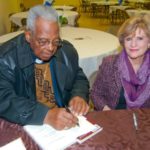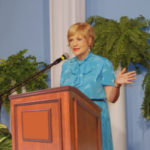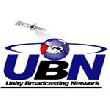
Leave a Legacy – Write Your Book

Starting your book can be a big deal. In fact it is a big deal. What you have to say is important.
And leaving your messages in a hands-on touchable form can be very significant.
Several years ago my husband and I purchased a house which had been in his family for over 130 years. A couple of generations earlier, the owners had been some aunts who were college professors. They never married. Their entire lives were given to teaching at a small, liberal arts college.
The two ladies were avid readers and life-long learners – and there was plenty of evidence to prove it. Every room in the house had bookcases loaded with books and magazines. In the attic and in upper regions of the packed closets were boxes of research and papers.
On several lazy afternoons I found myself upstairs in “Aunt Bess’s” old bedroom, rummaging through some of the boxes. My favorites were the many letters and cards they had received in the late 1800’s and ealy 1900’s.
The handwriting on each letter was like a work of art. You could see where the pen had been freshly dipped into the ink, and dripped on the paper. Every card was like a masterpiece of calligraphy.
But the most important part to me was what they said. The messages concernng the growth of the town and the college. The inquiries about other professors and their importance to the region.
The letters which were the most valuable were those which expressed special thoughts concerning Jesus, the strength of the church, or problems of the nation or region. Those were the ones which reflected the pulse of the times.
Some of the letters were written on a typewriter, but all of them were on paper. Physical copies which could be stored and handed down from generation to generation.
Fast forward a century, and paper is sometimes thought of as obsolete. We repeatedly opt into online statements and receipts. We buy digital books and magazines. We communicate with email or texts.
All of that is terrific. It’s much faster and easier.
But wouldn’t it be nice to leave someting tangible for your descendants? Wouldn’t your grandchildren like to know what you have to say? (Especially when they are older). Wouldn’t future generations like to have something they can hold in their hands? Something which relays your thoughts in this day and age? Something which describes the psychology of this specific time in the earth?
Digital methods are wonderful for quick and easy communication, but those messages won’t last forever. They always require special equipment – whether phones, tablets, or computers – to acess them. And as devices gain in sophistication, old files are not always obtainable.
So back to the value of books.
If Aunt Bess’s letters had been digital, they would have been long gone. I never would have been able to read and enjoy them.
As you are making a decision about writing your book, these are things to consider. You want to leave something that is lasting. And tangible. And transferrable from generation to generation.
Your book may be your autobiography, ideas for raising your children, or lessons from the Bible – with your special emphases. The very fact that you are putting on paper ideas which can be passed on from generation to generation is a very significant thing.
So let me encourage you.
If you have thought about writing a book, then do it. The next posts will be about tips for making it happen. With a few techniques – and tricks – you will be well on your way to having something to pass on to your grandchildren.
So Where Do I Start?
Now I know how it is. Your next thoughts will be how in the world do I get started? Very often we have many ideas floating in our heads in a disorganized fashion.
How do I get these thoughts into some sort of coherent form? What do I really want to say? Are these ideas important enough for anyone to want to read them?
The answers come one item at a time. When you write a book, you are beginning a journey, and you take it one step at a time. That’s how it’s done.
So take a deep breath. Relax. And begin to define your goals.
Who are you writing for? Your family? Women? Men? What ages are you trying to impact?
What do you want to accomplish with your book? Is it for education? Inspiration? Humor?
If you will spend some quality time in this early planning stage, your writing will be much easier. You will be able to stay focused as you complete your writing.
For additional ideas about this early planning stage, grab a free copy of my E-book, Want to Write a Book? Engage Your Mind.
You may grab your free copy HERE.
In the Meantime, Keep on Soaring,
![]()











